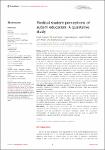Medical student perceptions of autism education: A qualitative study
| dc.contributor.author | Gallaher, L | |
| dc.contributor.author | Butler, C | |
| dc.contributor.author | Banerjee, S | |
| dc.contributor.author | Wright, J | |
| dc.contributor.author | White, A | |
| dc.contributor.author | Daley, S | |
| dc.date.accessioned | 2023-04-17T13:46:00Z | |
| dc.date.available | 2023-04-17T13:46:00Z | |
| dc.date.issued | 2023-02-28 | |
| dc.identifier.issn | 2673-6861 | |
| dc.identifier.issn | 2673-6861 | |
| dc.identifier.other | ARTN 1096117 | |
| dc.identifier.uri | https://pearl.plymouth.ac.uk/handle/10026.1/20720 | |
| dc.description.abstract |
Background: The global prevalence of autism is reported to be at least 1% and is rising. Autistic people have a range of comorbidities resulting in a high use of health services. Doctors of nearly all specialties are likely to encounter autistic people in their practice. Autistic people report dissatisfactory care and encounter disproportionately worse health-related outcomes than non-autistic people, which in part has been attributed to a lack of skill and awareness in the medical workforce. At present, autism education is not always included in undergraduate medical curricula. In England, the Department of Health and Social Care has mandated that autism education should be included in all undergraduate medical curricula but current evidence relating to the delivery and receipt of autism education is poor. A greater understanding of medical student perceptions of autism education is required to inform curriculum development. This qualitative study sought to explore the perceptions of autism education in final year medical students at a medical school in South-East England by 1) assessing their perceived preparedness to care for autistic people once they have graduated from medical school and 2) determining their perceived acceptability of a new undergraduate education programme, Time for Autism (TfA). Materials and methods: A purposeful sample of ten final-year medical students were recruited. Students completed in-depth, individual interviews. Data was analysed using thematic analysis. Results: Four key themes were identified: Learning environment, Exposure, Relevance and Curricular priority. The findings of this study indicate that medical students perceived greatest value in autism education when it was directly relevant to developing preparedness for practice. Value was influenced by the perceived curricular priority attached to autism education. The new autism programme, Time for Autism was perceived to add relevance and priority to autism education in the existing curriculum in this medical school setting. Discussion: The study findings shed new light on medical education literature, emphasising the importance of congruence between the provision of autism education and the prioritisation of autism education within the curriculum. Consideration of relevance and curricular priority can be used to support the development of autism education in future medical curricula. | |
| dc.format.extent | 1096117- | |
| dc.format.medium | Electronic-eCollection | |
| dc.language | eng | |
| dc.publisher | Frontiers Media SA | |
| dc.subject | autism | |
| dc.subject | medical student | |
| dc.subject | education | |
| dc.subject | awareness | |
| dc.subject | workforce | |
| dc.title | Medical student perceptions of autism education: A qualitative study | |
| dc.type | journal-article | |
| dc.type | Article | |
| plymouth.author-url | https://www.ncbi.nlm.nih.gov/pubmed/36926183 | |
| plymouth.volume | 4 | |
| plymouth.publication-status | Published online | |
| plymouth.journal | Frontiers in Rehabilitation Sciences | |
| dc.identifier.doi | 10.3389/fresc.2023.1096117 | |
| plymouth.organisational-group | |Plymouth | |
| plymouth.organisational-group | |Plymouth|PS - Office of Vice Chancellor | |
| plymouth.organisational-group | |Plymouth|Faculty of Health | |
| plymouth.organisational-group | |Plymouth|REF 2021 Researchers by UoA | |
| plymouth.organisational-group | |Plymouth|Users by role | |
| plymouth.organisational-group | |Plymouth|Users by role|Academics | |
| plymouth.organisational-group | |Plymouth|REF 2021 Researchers by UoA|UoA03 Allied Health Professions, Dentistry, Nursing and Pharmacy | |
| plymouth.organisational-group | |Plymouth|Faculty of Health|Peninsula Medical School | |
| plymouth.organisational-group | |Plymouth|Users by role|Researchers in ResearchFish submission | |
| plymouth.organisational-group | |Plymouth|Faculty of Health|Peninsula Medical School|PMS - Manual | |
| dc.publisher.place | Switzerland | |
| dcterms.dateAccepted | 2023-01-13 | |
| dc.date.updated | 2023-04-17T13:45:59Z | |
| dc.rights.embargodate | 2023-4-18 | |
| dc.identifier.eissn | 2673-6861 | |
| dc.rights.embargoperiod | forever | |
| rioxxterms.versionofrecord | 10.3389/fresc.2023.1096117 |


